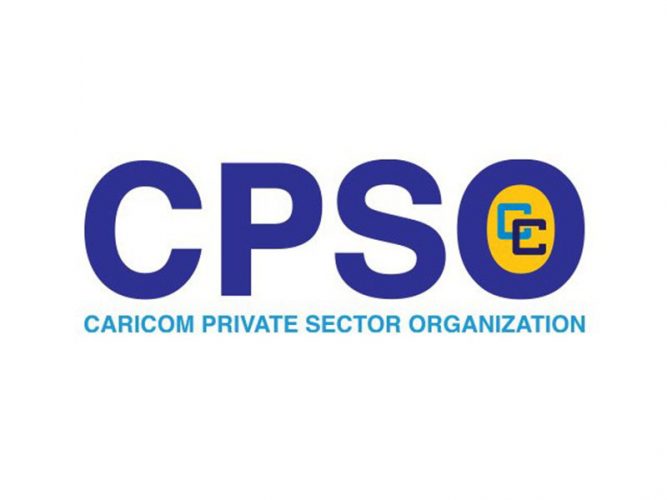The Private Sector Com-mission (PSC) yesterday defended Guyana’s local content law and castigated a little known regional business body for suggesting that the legislation might contravene the Revised Treaty of Chaguaramas (RTC) which underpins CARICOM.
On Wednesday, a leaked email from the CARICOM Private Sector Organisation (CPSO) revealed that it was of the view that the recently passed Local Content Act might in parts violate the RTC and it would therefore approach the government here and CARICOM on the matter. The email was distributed by CPSO Chairman, Gervase Warner who also happens to be the President and CEO of the Trinidad-based Massy Group. The contents of the email and initial local reaction to it were reported in yesterday’s Stabroek News.
Following a meeting on the matter, the PSC last night blasted the CPSO.

“The PSC questions the legitimacy of the CPSO which constituency consist of some Pan Caribbean companies (and notes) that the organisation does not represent the interest of the local private sector”, a statement from the PSC said.
The PSC said that it notes that the purpose of Local Content straddles countries, regions and continents and forms an integral part of the Petroleum Sector.
“The PSC wishes to note, in fact, that Trinidad and Tobago has had in place for more than 50 years, a regime of local content “predicated on maximising citizens’ ownership, control and financing of all activities along the energy resources sector” thus giving preference to Trinidadians.
“The Commission is satisfied that the policies expressed in Guyana’s Local Content Act are not dissimilar to those of Trinidad and Tobago’s and do not violate the revised Treaty of Chaguaramas.
“We therefore stand by and fully endorse the aims and objectives of the Act which are designed to ensure that Guyanese companies and nationals benefit from the Oil and Gas sector.
“The PSC welcomes foreign investors and urges respect for the country’s laws and sovereign space”, the private sector statement said.
Hours earlier, the CPSO issued its own statement aimed at damage control while maintaining that it would be approaching the government here and CARICOM on the local content act. It also emphasised that the concerns raised reflect the views of the CPSO and not that of any specific member company. That statement appeared aimed at the fact that Massy has major holdings in Guyana and there had been criticisms levelled at it in the aftermath of the leaking of Warner’s email.
In the statement, the CPSO said its attention has been drawn to numerous exchanges in the Guyana media on routine internal communication emanating from the CPSO Chairman after the CPSO Executive Committee Meeting of January 11th, 2022.
“Unfortunately, that communication appeared to have been leaked without the benefit of any explanation of context and intent. As is sometimes the case when such leaks occur, there has been much misinterpretation and misrepresentation”, the organisation said.
It stated that the CPSO’s Executive Committee Meeting of January 11th, 2022, considered
several matters on the Agenda and among them was Guyana’s recent passage of Act No 18, 2021, Local Content Act 2021.
“That discussion highlighted the concerns of the CPSO Executive Commit-tee Members that the Local Content Act appeared to contravene various provisions of the Revised Treaty of Chaguaramas (RTC).
“The Meeting reached a consensus, in keeping with its mandate, to seek consultations with the Office of the President of the Cooperative Republic of Guyana and depending on the outcome, to raise the matter with the CARICOM Secretariat”, the CPSO said.
It added that CPSO Director Suresh Beharry of the Beharry Group of Companies was requested to facilitate a meeting between the CPSO and the Office of the President of Guyana to discuss the sensitive issue. This revelation which was contained in the leaked email led to its own fallout after a statement was issued yesterday on Beharry’s behalf emphasizing his support for the Local Content Law.
The statement issued by Tagman said: “Mr. Beharry was not tasked to advocate for the position contended for by some regional businesses. The sum total of his advice to certain entities was that they seek constructive dialogue and engagement with our Government and local stakeholders and to avoid any confrontation or disruptive fallout. In the interest of comity, he was prepared to attempt to facilitate an initial engagement.
“Mr. Beharry supports Guyana’s Local Content legislation; in particular, as it relates to the nascent Oil and Gas Industry. In fact, like many others, he has contributed to the in-depth discussions on Guyana’s Local content legislation at each of many iterations.
“Further, Mr. Beharry welcomes the provisions, protections, and incentives that are provided for all Guyanese businesses to invest and grow in our oil and gas space”.
The CPSO statement said that the leaked internal communication penned by the CPSO Chairman, Warner was contained in an email which in its signature block, described Warner’s position as President and Group CEO of Massy rather than as Chairman of the CPSO. It said that this was an unfortunate error.
“At all material times, Mr. Warner acted under his remit as Chairman of the CPSO, and not in his substantive position as President and Group Chief Executive Officer of Massy. Despite this error, the communication clearly and irrefutably refers to proposed CPSO actions that are appropriately within its mandate and the various levels at which urgent consultations should be sought to address any possible issues regarding the legislation”, the statement added.
Having regard to the CPSO’s mandate and premised on the importance of consultations as recognized in the RTC, under Article 26, the CPSO reiterated that it fully intends to seek dialogue with Guyana and where the policy issues warrant consideration by the Community, to engage in such a search for “pro-CARICOM outcomes”.
It said that the public attention which this matter has attracted, and the cross-border concerns that arise for the private sector, are evidence of the importance of the CPSO in providing agency to cross-border private sector concerns.
“The CPSO, does not claim to be the arbiters of right and wrong on matters which appear to subtract from settled rights emanating from the RTC. The CPSO, however, has been charged with the responsibility to raise issues and seek consultation and possible resolution of such on matters pertaining to the full implementation of the CSME.
“While the CPSO assumes no liability for the unauthorized leak of our internal Executive Committee communication, we do feel it our responsibility to apologize to the People of Guyana for the ‘media spectacle’ to which this has apparently contributed”, the CPSO statement added.
CPSO is an Associate Institution of the Caribbean Community invited by the Conference of Heads of Government to engage, in a formal and structured manner, with the Organs of the Caribbean Community in an effort to secure the full implementation of the CSME.
On Wednesday night, members of the local private sector had lashed out against the contents of the email.
“If the Trinidad Private Sector or government wants to challenge Guyana’s Local Content Legislation, it’s time for the Government of Guyana to exit CSME (Caricom Single Market and Economy) and review the benefits of Caricom,” George-town Chamber of Commerce and Industry President Timothy Tucker wrote on his Facebook Page.
Former Private Sector Commission Chairman Nicholas Boyer said on his Facebook page, “I’ve seen an email which says that there could be possible legal challenges to GY Local Content Law under the Treaty of Chaguaramas. It would be quite interesting to see such a challenge mounted, as the context of the law, the email and its sender are quite amusing. “Firstly the law – the Local Content Law of Guyana affords Guyanese the opportunity to provide a select grouping of goods and services (within certain prescribed percentages) to the oil and gas industry. The schedule in the law has the 40 categories, this was heavily reduced from the initial proposed number of categories.”
He continued, “Secondly the sender – the email was sent by someone in a senior role at a regional conglomerate. I am quite interested as to what this conglomerate thinks it would have to gain if they challenged this law. For instance, this same conglomerate ironically benefits from a large number of sales of vehicles to local transportation companies which provide transportation services to the O&G industry.”
Boyer opined that in a wider context, “the email to me shows ignorance of the mood, sentiments and aspirations of Guyanese people, and an arrogance that there is a god given right to have at this new industry in Guyana. Funny enough, large companies from other countries, far far larger than these regional conglomerates, have shown respect to the Guyanese people and worked with them in the spirit of partnership to grow capacity. The most disrespect I have seen, has come from these conglomerates who feel a sense of entitlement, the same ones who ironically have destroyed small businesses in their own backyard, and thereby hurt their own oil industry; now they want to do the same to ours
“Referencing a number of jobs here that objections have been raised about, Boyer added, “Are they really coming to do transportation and the other 40 items that we’ve carved out for Guyanese? Is it that they either are that desperate for a piece of the pie or do they feel that entitled?”





